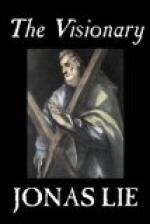David had a small collection of what he called classical music, long compositions which he played from the notes. They were not much to my fancy, and always struck me as being of a piece with what was strange in his manner when he posed as a logician. When he played them it was more like severe, mental, school exercise than anything his heart was in; and he played as correctly as he argued or wrote.
The times when classical music and critical conversations ruled in his room, were certainly those in which he felt his mind most in balance. He was less hearty in manner then, even towards me.
But then would come times when the music-stand would remain in the corner. He would sit for a long time looking straight before him, as if lost in thought, and then give expression to his feeling, on his violin, in all kinds of fantasies, which pleased my uncultivated ear far more than his so-called classical music.
He sometimes played a variety of small pieces, and then gradually sank into his own peculiar minor strain, and sometimes into a wonderfully sad melody. I very seldom heard him play anything right through, and then always in a kind of self-forgetfulness. At such times, I had a feeling that he was confiding to me something beautiful that he had lost, and over which he could never cease to mourn.
At a later period of our friendship he became, as I have said, more irregular in his habits, and was seldom to be found at home; he would sometimes talk ironically about his comrades, the professors and things in general, and his sarcasm was almost biting.
I was privileged to take my friend’s key, and go into his room, even when he was not at home. If his violin hung uncared for, I knew that something was wrong, and that his own condition answered to that of his instrument. The first thing he did, when all was right again, was carefully to put it in order.
But never during those times had I seen his treasure so badly treated and neglected as when twenty years later, I found it again, dusty and cracked at the back of the bookshelf. The reader will now be able to understand how sorrowful were the reflections it aroused, and how it led me to suspect the story of a joyless life; and I trust he will forgive me for having taken him so far from David Holst’s room—where I sat and waited for my friend to come with the punch—into the land of my youthful recollections. For three years we had been together almost daily. After that David had to go out as tutor, and our ways parted, as they so often do in this life.
And this evening we had met again.
There was a jingling in the passage, and immediately after David Holst carefully opened the door for a servant-girl, who brought in a steaming jug of hot water and other requisites for punch, which were most welcome to a man who had been out several hours in the wind and rain, as I had that very afternoon.
David found me installed on the sofa with his pipe in my mouth and his slippers on my feet, just as he would have done in the old days, and this I reckoned as one of my cunning artifices; for with these passes, his pipe and slippers, I reinstated myself, without more ado, on the old friendly footing. I felt like a general who is fortunate enough to open the campaign by occupying a whole province.




